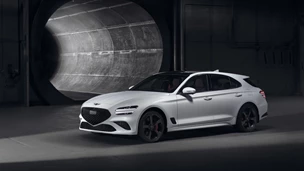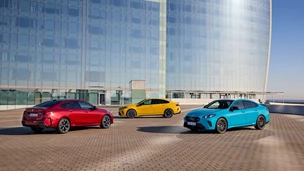The old lady crossing in front of me didn't know her time had nearly come with the car of tomorrow. She could have hit the headlines as the first person to be knocked down by a FCEV in the UK if I had not spotted her ambling in front of the near silent Toyota FCHV-adv and oblivious to its approach. The lack of noise generated by the future-car is probably its immediate impression. It looks fairly conventional like a modern cross-over or SUV and only the eagle-eyed who spotted what was not there, a conventional exhaust pipe, would realise this is something different. At the other end it drives like any conventional car with an internal combustion engine or hybrid drive system and you simply turn the key, engage drive and move away. And it moves off silently. The indicator makes more noise than the transmission, while the tyres can rumble over a manhole cover but that's about it. Around town you get no impression about its powertrain and even when you hit more open roads and accelerate hard it is the wind noise you begin to notice along with some road rumbles from poorer surfaces. Pick up is brisk, power delivery is smooth and unhesitating and there is some powertrain braking when you slow down but not as much as you might expect with, say, a diesel. The fuel filler is conventional, the high pressure fuel tanks are spread under the vehicle and it still has a good bootspace so it's a very practical modern car. If a wide network of hydrogen fuel filling stations can be created, the Toyota FCHV and its kin will offer uncompromising and zero carbon mobility, and you'll just have to look out for the old ladies. Hydrogen is the most plentiful source of fuel in the universe, it is a by-product of many industrial processes, and the fuel cell transforms it into electricity and heat with only pure water emitted. As a liquid or gas it can be carried in a vehicle which can be quickly refilled and driven without compromise. Technology developed for electric vehicles and conventional hybrids can be adapted with FCEVs at minimum cost. The price of FCEVs, their insurance premiums and residual values, will have to be addressed over the next three years and will be the subject of further discussions. So will the need to create a fuel supply network, probably based on production of hydrogen at source and used by commercial fleets that may tanker it into sites. Large industrial operators could be fuel costs' free if they correctly harness hydrogen production. Milestones Toyota FCHV-adv Mechanical: 90kw Toyota Fuel Cell Stack and 90kw permanent magnet electric motor developing 260Nm, constant drive. Performance: 95mph, 15mpg (approx). For: Easy to use, near silent, comfy and roomy for five people, zero CO2 emissions. Against: Lack of refuelling stations, apparent high fuel consumption, not yet on sale, no vehicle or fuel price indications.




